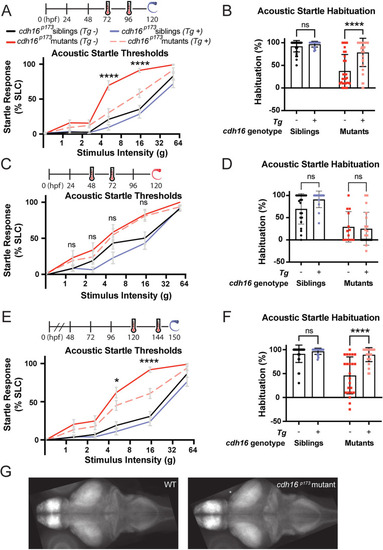|
Ubiquitous expression of cdh16 after circuit development restores habituation and acoustic sensitivity. (A)hsp70p:cdh16-p2a-mKate expression was induced at 72 and 96 hpf (hours post-fertilization) via heat-shock. Behavior testing and analysis performed at 120 hpf. Induction of cdh16 expression in cdh16p173 mutants (n = 38) results in significantly lower startle sensitivity compared to cdh16p173 mutants that are heat-shocked but do not carry the transgene (n = 25). ****p < 0.0001. (B) Heat-shock as in A has no effect on habituation (p = 0.7204) of siblings (n = 41 with the transgene versus n = 26 without). In contrast, heat-shock induction of cdh16 expression significantly restores habituation (p < 0.0001) in cdh16p173 mutants carrying the transgene (n = 38) in comparison to transgene negative mutants (n = 29). (C)hsp70p:cdh16-p2a-mKate expression was induced at 48 and 72 hpf via heat-shock. Behavior testing and analysis performed at 120 hpf. Acoustic startle sensitivity is not significantly restored in cdh16p173 mutants carrying the heat-shock transgene (n = 19) when compared to mutants with no transgene (n = 13). These data are consistent with a requirement for maintenance of cdh16 expression during behavior (p > 0.7 for all stimulus intensities). (D) Heat-shock as in C has no effect on habituation (p = 0.1073) in siblings expressing the transgene (n = 15) in relation to siblings not expressing the transgene (n = 21). Similarly, the difference in acoustic startle habituation in transgene-expressing mutants (n = 19) and mutants not expressing the transgene (n = 13) is not significant (p = 0.9199). (E)hsp70p:cdh16-p2a-mKate expression was induced at 120 and 144 hpf (after the acoustic startle circuit is functional) via heat-shock. Behavior testing and analysis performed at 150 hpf. Hypersensitivity is rescued in cdh16p173 mutants (n = 27) carrying the transgene as compared to mutants lacking the transgene (n = 20). (*p = 0.0380, ****p < 0.0001). (F) Heat-shock as in E has no effect on acoustic startle habituation (p = 0.6607) in siblings carrying the transgene (n = 21) compared to siblings lacking the transgene (n = 28). Conversely, cdh16 expression restores habituation to acoustic stimuli (p < 0.0001) in mutants carrying the transgene (n = 31) as compared to mutants without the transgene (n = 23). For A, C, and E, error bars indicate SEM. For B, D, and F, error bars indicate SD. (G) Representative whole-brain stacks for WT (n = 16) (left) and cdh16p173 mutants (n = 13) (right), showing a lack of brain volume changes at 6 dpf. The data underlying this figure can be found in S1 Data.
|

